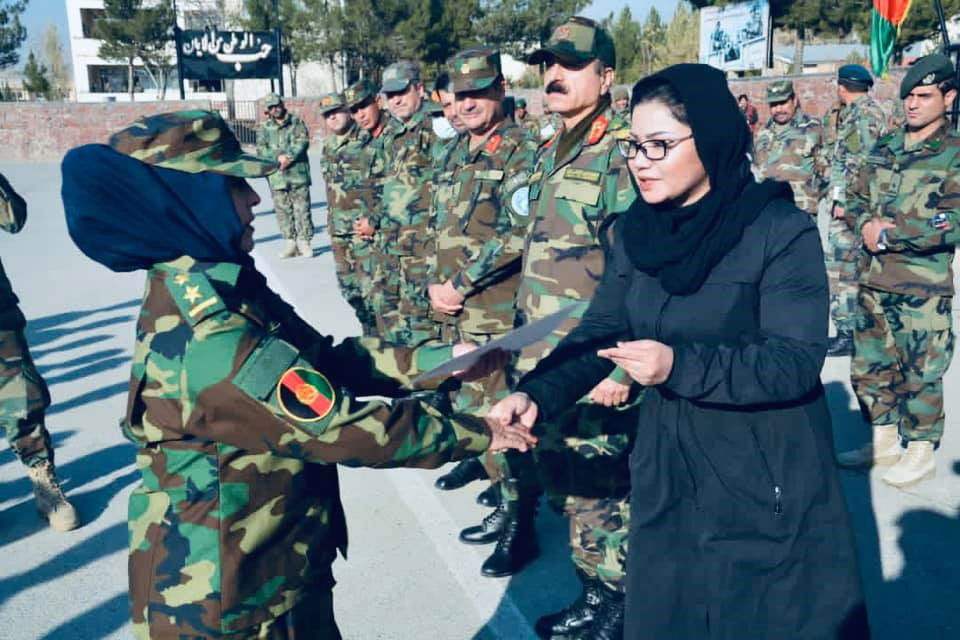The role of women in the Afghan National Army and the challenges they face
Afghanistan is one of the most challenging countries for military women.
However, there are about 2,400 Afghan women and girls in the national army/army of this country. Ms. Munira Yousafzadeh, Deputy Minister of National Defense for Education and Personnel Affairs, said in an interview with us: Perhaps in terms of quantity, they make up a small percentage of the country's national army; But in terms of quality, they have an effective presence.
Today, women are present as air force pilots, commando soldiers, military generals, criminal investigation officers, military training professors, and in logistics departments. The presence of women in different departments shows maturity, intellectual growth and society's trust in women. But he adds: Although it is a developed country compared to Afghanistan.
But at the same time, there were thousands of women in the police, army and national security of Afghanistan, and the presence of women in different departments shows maturity, intellectual growth and society's trust in women. Although women are present in all military sectors of the country, I look at the presence of women in the security sector from a different angle.
I have hope for the day when women will be present in military structures not because of their gender but because of their effectiveness and participate in maintaining the territorial integrity of the country. He says about the challenges and obstacles these women face: When we talk about the challenges facing women in the national army. It is good to specify the responsibility of the government and the nation.
We passed the dark period of the Taliban, we entered a stage where the presence of women in different social, cultural, security and administrative levels was noticeable even in the region. The government laid the groundwork for the presence of women in the security sectors, but the nation is also responsible to support the presence of women in the military sectors. What percentage of families allow their daughters to wear military uniforms? This basic question should be answered by the people of Afghanistan: do we all like our sister, daughter, wife or mother to wear military clothes and provide this safe environment? The second debate is the cultural debate.
The dark period of the Islamic Emirate of the Taliban and the civil wars before that caused Afghan women to be deprived of the right to education. During the war, the priority of society changed. The families stopped talking about development and progress and focused on providing daily food and clothing. Education, which is one of the foundations of progress and development of a country, was graded in Afghanistan; That is, the priority of education was considered the right of men, and women were prevented from education.
Another issue that is discussed is the presence of women; In the first decade and a half, we focused on the quantity of women's presence, but in the last five years, more attention has been paid to the effectiveness and quality of their presence.

The role of women in the Afghan National Army... Limiting the presence of women to statistics in government offices may make them look like vases to decorate an office. It means symbolic presence. For example, in an administrative structure, two women were placed in a group of 20 people in order to respect the gender balance, while they were not given the opportunity to express their opinion, or because of the historical oppression and oppression of these women, they could not ask for their opinion on the eighteen male members. The group accepted. This was the situation in the past years. In recent years, I have noticed that women's priorities are very different from yesterday.
Today, women prefer language education and master's degree and working in high and qualified degrees. In the Ministry of Defense, we created the National Council of Military Women in the past year and took action to create the World Council of Military Women. This request of ours was welcomed by our military supporters, especially the decisive support mission in Afghanistan. Our wish was that the women of Afghanistan, as they are the main victims of the phenomenon of terrorism and extremism, should be responsible for the leadership of the council as models of this council. Unfortunately, due to the spread of the corona virus in the world, the follow-up process was delayed. We are also going to sign Afghanistan's sisterhood bond with countries whose defense ministers are women.
Shabnam Niazi